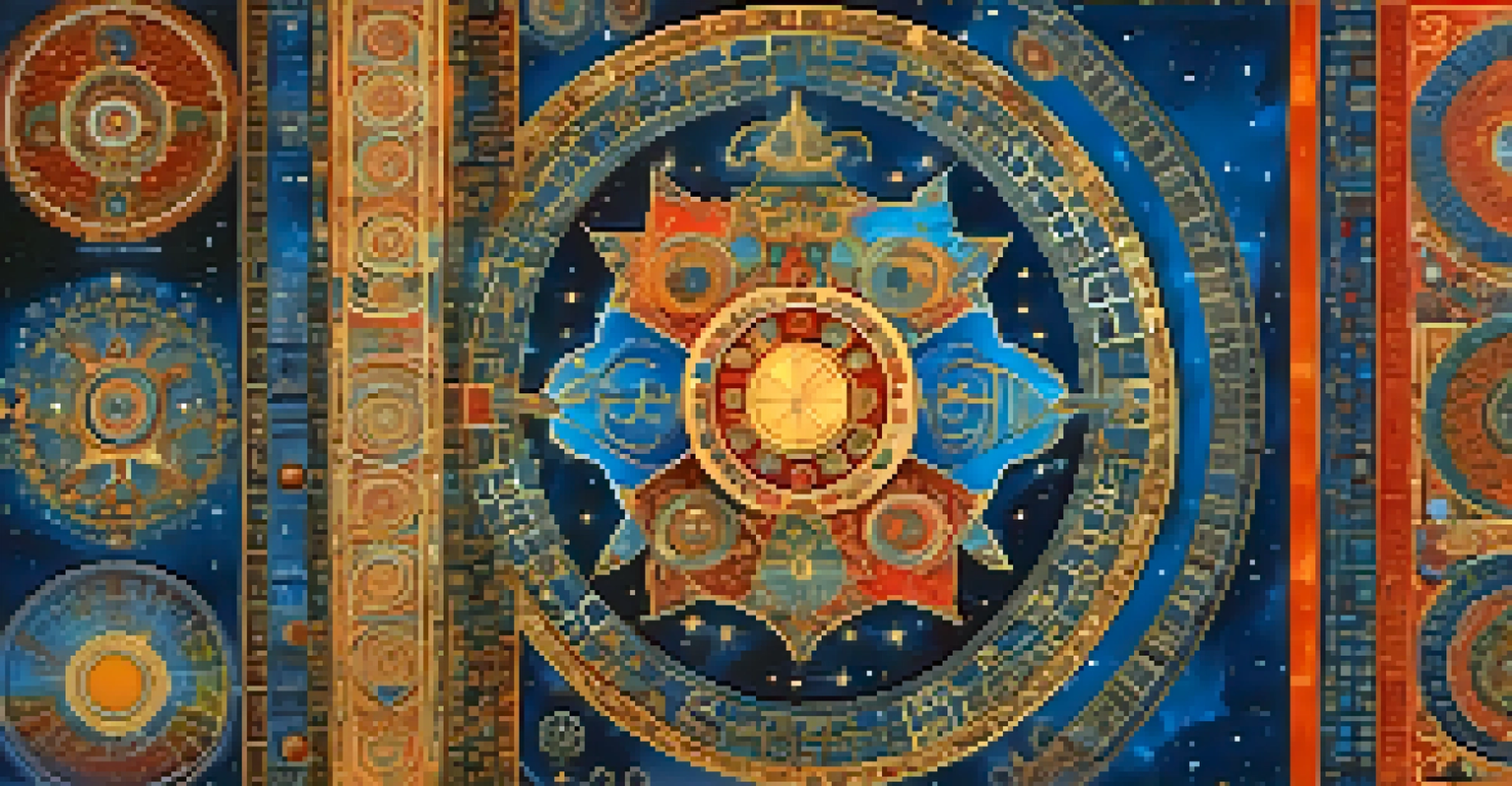The Role of Time in Hindu Philosophy and Spirituality

Understanding Time as a Cyclical Concept in Hinduism
In Hindu philosophy, time is often viewed as cyclical rather than linear. This idea is beautifully illustrated by the concept of 'Kalachakra' or 'Wheel of Time,' which represents the eternal cycle of creation, preservation, and dissolution. This cyclical nature means that events and experiences are bound to repeat, emphasizing the importance of understanding and learning from the past.
Time is a created thing. To say 'I don't have time,' is like saying, 'I don't want to.'
Unlike Western perspectives that focus on a definitive beginning and end, Hinduism encourages individuals to see time as a continuous flow. This perspective fosters a sense of patience and acceptance, as adherents believe that everything is transient and part of a larger cosmic order. For instance, the cycle of seasons mirrors this idea, representing rebirth and renewal.
Recognizing time as cyclical also impacts spiritual practices, encouraging rituals and celebrations that honor the cycles of nature. Festivals like Diwali and Holi are rooted in seasonal changes, allowing devotees to reconnect with the rhythms of life and the universe.
The Concept of Yugas: Ages of Time in Hindu Belief
Hindu philosophy divides time into four distinct epochs known as 'Yugas': Satya Yuga, Treta Yuga, Dvapara Yuga, and Kali Yuga. Each Yuga represents a different stage of moral and spiritual evolution, with Satya Yuga being the most virtuous and Kali Yuga representing a decline in righteousness. This framework provides context for understanding humanity's progress and challenges over time.

The cycles of Yugas illustrate that time is not only a physical dimension but also a moral one, influencing spiritual evolution. For instance, followers believe that we are currently in Kali Yuga, a time characterized by chaos and moral decline, prompting the need for greater spiritual awareness and practice. This awareness encourages individuals to seek out knowledge and virtue in their lives.
Time is Cyclical in Hinduism
Hindu philosophy views time as a continuous cycle of creation, preservation, and dissolution, encouraging individuals to learn from the past.
By recognizing the Yugas, practitioners can better understand their place in the universe and the importance of spiritual growth. This understanding fosters a sense of urgency to engage in positive actions, as each individual's choices contribute to the collective journey through these epochs.
Karma: The Interplay of Time and Action
Karma, a central tenet of Hindu philosophy, emphasizes the relationship between time and action. It posits that every action has consequences, which can manifest in this life or future incarnations. This understanding of time encourages individuals to act mindfully, knowing that their decisions today will impact their tomorrow.
The journey of a thousand miles begins with one step.
The concept of karma also aligns with the cyclical view of time, as actions create a ripple effect throughout the ages. For example, good deeds may lead to positive outcomes in the present or future lives, while negative actions can result in suffering. This belief system instills a sense of responsibility, urging individuals to cultivate positive karma through ethical living.
Ultimately, understanding karma in relation to time prompts a deeper reflection on one's life choices. It encourages individuals to embrace the present moment, recognizing that every action contributes to their spiritual journey across lifetimes.
Moksha: Liberation from the Cycle of Time
In Hinduism, the ultimate goal of life is achieving 'Moksha' or liberation from the cycle of birth and rebirth. This concept highlights the desire to transcend time and the material world, reaching a state of eternal bliss and unity with the divine. Moksha signifies freedom from the constraints of time, allowing the soul to exist in its purest form.
The pursuit of Moksha involves various paths, including knowledge (Jnana), devotion (Bhakti), and disciplined practice (Karma Yoga). Each path emphasizes different aspects of life, but they all lead toward the same goal of liberation. By focusing on spiritual growth and self-realization, practitioners can break free from the cyclical nature of time.
Karma Shapes Our Future Actions
The concept of karma emphasizes that every action has consequences, urging individuals to act mindfully for positive spiritual outcomes.
Achieving Moksha not only signifies personal liberation but also impacts the collective consciousness. As individuals strive for this goal, they contribute to the spiritual evolution of humanity, fostering a deeper understanding of time and existence.
Rituals and Time: Aligning with Cosmic Cycles
Rituals play a significant role in Hindu spirituality, often designed to align with cosmic cycles and auspicious timings called 'Muhurta.' These rituals, whether daily prayers or grand festivals, are carefully timed to maximize their spiritual impact, illustrating the belief that certain moments are more favorable for connecting with the divine.
For instance, many Hindus observe specific times for prayers (Puja) based on lunar phases or seasonal changes. This practice exemplifies the idea that time is not merely a backdrop for activities but an integral component that enhances spiritual efficacy. By engaging in rituals at the right moments, practitioners believe they can harness the energy of the universe.
Additionally, communal rituals foster a sense of belonging and shared purpose. They create collective experiences that reinforce connections among individuals and with the cosmos, reminding participants of their place within the grand tapestry of time.
The Philosophical Underpinnings of Time in Scriptures
Hindu scriptures, such as the Bhagavad Gita and the Upanishads, provide profound insights into the nature of time. These texts explore the philosophical implications of time, emphasizing its impermanence and the importance of detachment from temporal concerns. This perspective encourages individuals to focus on spiritual growth rather than material pursuits.
For example, the Bhagavad Gita teaches that while the physical body is subject to birth and death, the soul is eternal and beyond the realm of time. This understanding fosters a sense of peace, as adherents learn to navigate the challenges of life with a broader perspective. It emphasizes the need to cultivate inner strength and resilience.
Moksha as Liberation from Time
The ultimate goal in Hinduism is achieving Moksha, which signifies liberation from the cycles of birth and rebirth, leading to eternal unity with the divine.
Through the wisdom found in these scriptures, practitioners gain clarity on their spiritual path. They learn to embrace the present moment, understanding that true fulfillment lies in aligning with their higher self rather than being consumed by the passing of time.
Navigating Personal Time: Mindfulness in Daily Life
Incorporating mindfulness into daily life is a practical way to honor the role of time in Hindu spirituality. By being present and aware, individuals can cultivate a deeper connection with themselves, their actions, and the world around them. This practice encourages a sense of gratitude and appreciation for each moment.
Mindfulness also allows practitioners to reflect on the cyclical nature of time, helping them recognize patterns in their lives. By observing their thoughts and actions without judgment, they can identify areas for growth and transformation. This self-awareness fosters personal development and spiritual evolution.

Ultimately, embracing mindfulness creates a harmonious relationship with time, encouraging individuals to live with intention and purpose. As they navigate their spiritual journeys, they can find joy in the present and cultivate a deeper understanding of their connection to the universe.